A clarion call has been made to governments and institutions to pave way for increased women’s participation in political spaces as this is key to increased democracy.
Despite the commitment made by most development agencies operating on the ground to mainstream gender into their programmes, women are still viewed as a vulnerable group instead of fully-fledged economic agents.
Poverty and lack of economic security are often regarded as some of the major barriers to women’s political participation.
Speaking during a regional workshop organised by the Institute For Young Women’s Development (IYWD), Zimbabwe Gender Commission Cheif Executive Officer, Virginia Muwanigwa lauded the Zimbabwean constitution for being progressive in fighting for women’s rights.
“As of now, our constitution is a bit better and it’s actually more progressive than it used to be before. Our role to ensure there is constitutionalism as far as gender issues are concerned. Our statistics leave a lot to be desired.
“In the last elections we had fewer women being put forward by the political parties for consideration and what this meant was that the outcome of the elections was compromised. So we formed what we call a Gender Observatory where we work with stakeholders in the women’s movements and civil society organisations and government to just monitor process up to the elections.
Muwanigwa said it is disheartening to note that most women who take up political spaces are victims of cyberbullying.
She also said it is imperative that governments must be awake to gender balances in key government appointments.
“We also continue to engage the executive that as they go into appointments they need to be aware of gender balance because our constitution talks abut non-discrimination,” she said.
Women continue to be under-represented in key positions related to policy and programme implementation. The principle of gender equality has not been properly integrated into the process and decentralisation has not provided a space which could have allowed women to influence the policies defined at the local governance level.
Women, especially those living in rural and peri-urban areas, continue to face major constraints such as poverty, lack of access to land and property, illiteracy and heavy domestic workloads.








